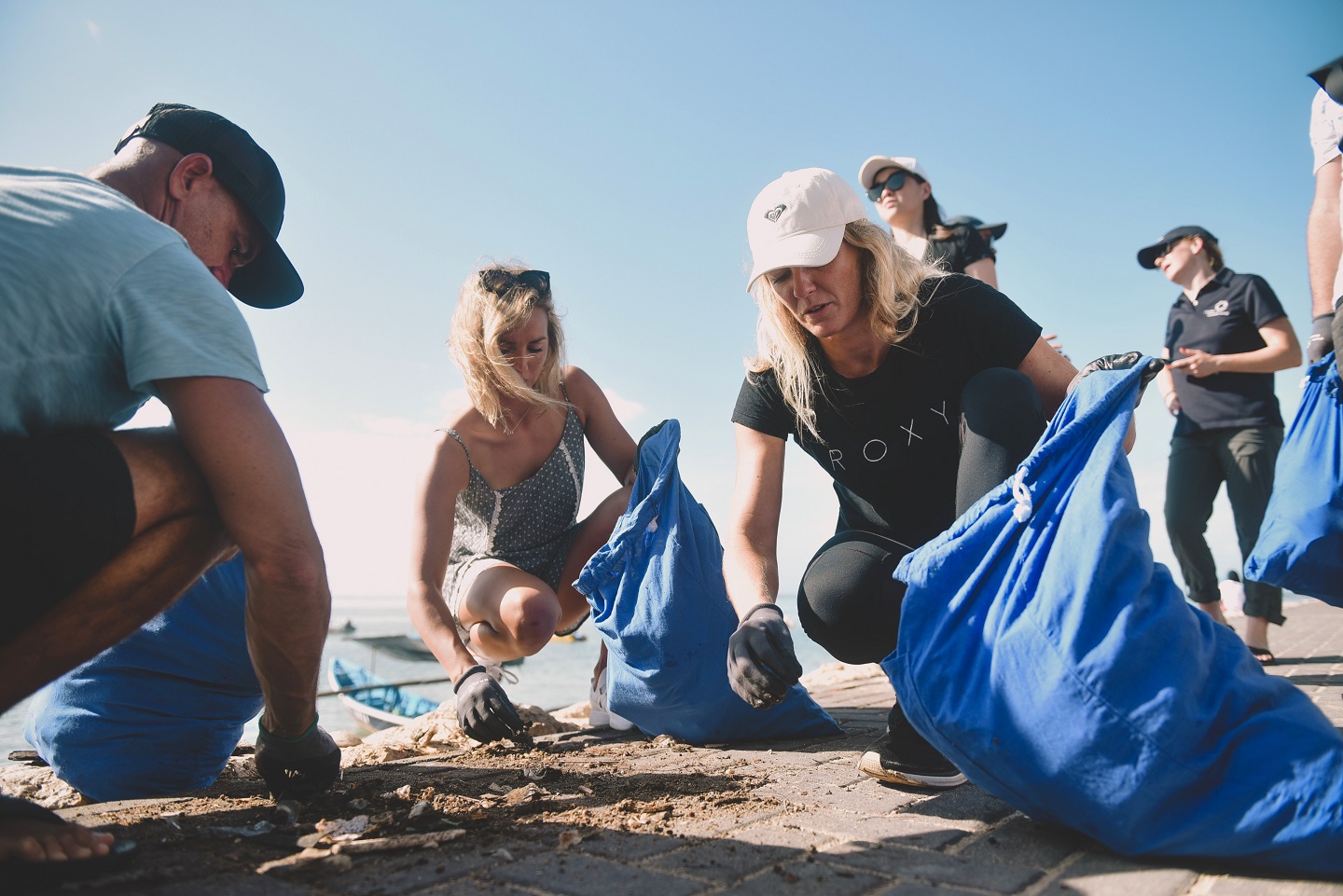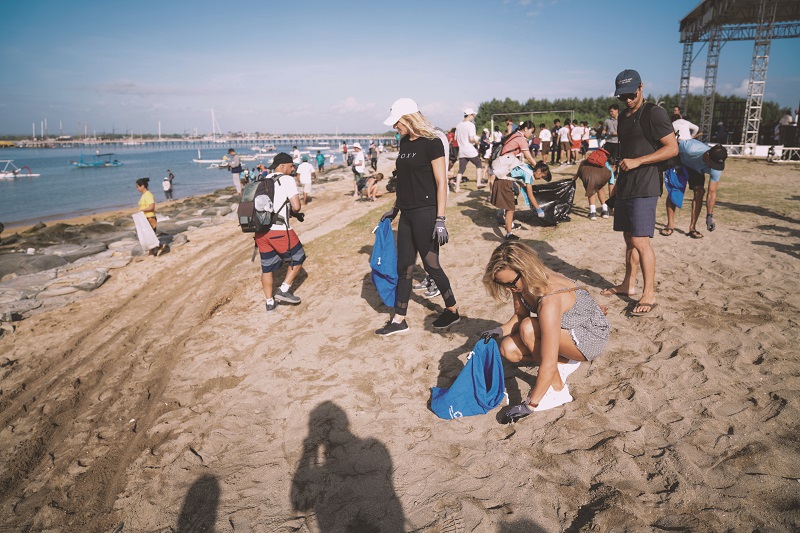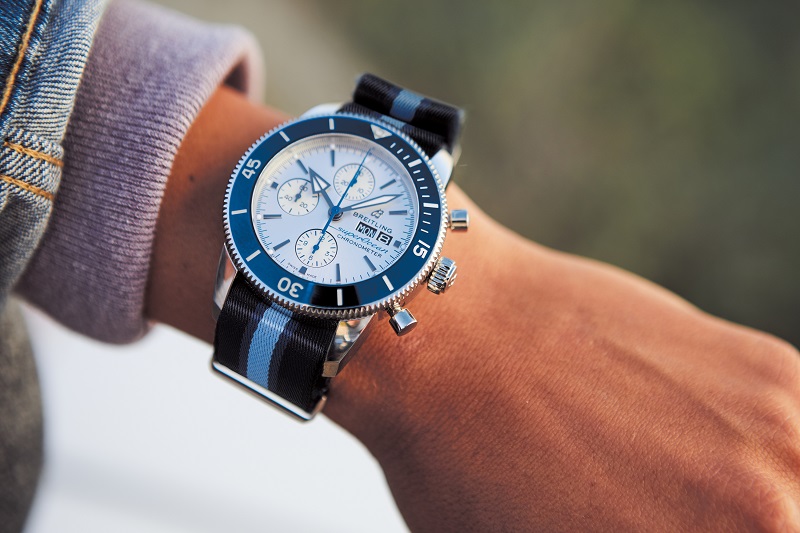
Breitling had invited over 100 guests to the clean-up, including members of partner organisation Ocean Conservancy, journalists from around the region and Surfer Squad ambassadors (Photo: Breitling)
But Breitling does not do things by halves. We are under a huge tent on Mertasari Beach in Sanur, a spot that warrants all the typical superlatives attached to a tropical seafront. Sanur, an idyllic beachside town on the coastal stretch east of Denpasar, was the landing site of the Dutch invasion in 1906, as well as the entry point for Japanese forces in World War II. Today, it is the island’s oldest upscale resort area and Mertasari Beach, while underrated next to the tourist haunts of Seminyak, Jimbaran and Nusa Dua, is nonetheless popular with joggers and holidaymakers.
Breitling had invited over 100 guests to the clean-up, including members of partner organisation Ocean Conservancy, journalists from around the region and Surfer Squad ambassadors Kelly Slater, Sally Fitzgibbons and Stephanie Gilmore. The rest of the crowd comprises local eco-warriors, from individual volunteers and environmental groups to hundreds of schoolchildren excited to be spending their school day on the beach.

The war on plastic
Speeches are usually dreaded at these events, but the speakers keep them short and impactful. A local representative outlines Bali’s fight against pollution. Last year, Indonesia ranked as the second largest plastic waste contributor in the world, behind only China. Bali was the subject of negative global press as divers and environmental organisations documented how its sparkling waters had transformed into seas of rubbish. A plastic bag ban was enforced this year, with governor Wayan Koster hoping to reduce the island’s marine pollution by 70%. The movement is being championed by the entire local tourism industry, whose livelihoods depend on the island retaining its reputation as an all-year summer paradise.
We see evidence of this at every location we visit. From the Hyatt Regency Sanur, where we stayed, and Breitling’s Superocean Heritage Ocean Conservancy Limited Edition timepiece launch at Banyan Tree Ungasan to cocktails and dinner at Omnia Dayclub Bali in Kuta, plastic straws, water bottles and bags have been replaced with friendlier alternatives.

Small enterprises have sprung up everywhere selling eco-conscious souvenirs: cloth bags, wooden cutlery and knick-knacks made from sustainable materials. While plastic still rears its head occasionally — the gelato kiosk around the corner of our hotel uses plastic spoons and hotels still stock snacks such as potato crisps in single-serve packages — these stand out as odd, rather than the norm.
“Bali was a natural choice for this clean-up, as Indonesia is not only one of the countries most impacted by ocean plastic, but its government is among the most committed to finding solutions to the problem,” says Nicholas Mallos, director of Ocean Conservancy’s Trash Free Seas Programme.
A close affiliation
Breitling’s relationship with the deep blue dates back to 1957, when it ventured into diving watches with the creation of the Superocean timepiece. Although the brand is largely known for its aviation design, its diving models found a firm fan base with their reliability underwater and urbane sophistication on the ground.
The new Superocean Heritage Ocean Conservancy Limited Edition is an extension of that legacy, the culmination of decades spent maturing its mechanical instruments while deepening its bond with the world’s waters. The stainless steel chronograph, which is limited to 1,000 pieces, wears its commitment to the cause on its caseback, with the Ocean Conservancy logo engraved alongside its production number. Beneath the scratch and shock-resistant unidirectional rotating bezel and silver-coloured dial, decorated with blue accents, is the in-house manufactured Calibre 13, a self-winding mechanical movement with a 48-hour power reserve and waterproof to 20 bar (200m).

Launched in tandem with the beach clean-up, a portion of sales of the Superocean Heritage Ocean Conservancy Limited Edition will be donated to Ocean Conservancy and its global fight against marine pollution. The model is presented with a pair of Nato straps made from ECONYL yarn, which is repurposed from nylon waste — sources include discarded fishing nets — in packaging made entirely from recycled material. In fact, Breitling Southeast Asia and Greater China president Alvin Soon announced at the clean-up that the brand is looking to transform its packaging processes by year-end so only recycled materials are used.
Advocates on the waves
When CEO Georges Kern assumed the mantle at Breitling in mid-2017, he brought to the brand his trademark capabilities in product streamlining and marketing. The previously confusing catalogue was reorganised into a straightforward matrix of product categories, boutiques were transformed into lifestyle lofts and the Squad on a Mission campaign was introduced.
He infused the campaign with the star power for which he is famous. Breitling’s squads correlate with its product categories and comprise ambassadors at the top of their respective games: the Cinema Squad, for instance, features Charlize Theron, Adam Driver, Brad Pitt and Daniel Wu. Backing the diving watches is the elite Surfer Squad: the 47-year-old Slater is a record-setting 11-time world surfing champion while Gilmore is not far behind with seven world titles and Fitzgibbons is the youngest on the squad and an upcoming star.
At a press conference following the launch of the Superocean Heritage Ocean Conservancy Limited Edition at the clifftop Banyan Tree, the Surfer Squad members speak frankly about their daily encounters with the effects of plastic pollution.
“Even just warming up in the surf, there is trash all along the way, and I’m paddling out and scooping up plastic bags as I go,” says Fitzgibbons.

Gilmore is quick to agree. “It’s really shocking, especially when you are in a place that is said to be paradise but there is trash along the reefs, in the waves, on the beach,” she shakes her head. “Surfing on the east coast is especially interesting. Some days it’s quite clean and you think, oh, okay, we are getting better at this. But then the wind changes and a huge amount of trash comes in with the waves and you realise all this is actually out in the ocean every single day. Even if the beach looks clean, it’s still out there. All it takes is for the wind to change to prove that. It made me realise how huge this issue is.”
Slater is a vocal advocate of ocean rehabilitation, even co-founding sustainable clothing brand Outerknown, which uses recycled fishing net and nylon sources to fashion board shorts and jackets. “We are exposed to so much pollution out in the sea,” he says. “We experience it first-hand every single day, from sewage leaks to plastic waste. There are things you might not see, but can smell or feel when you are in the water. I remember being in France when I was 18 or 19. There was so much rubbish in the water that I was worried about hurting myself if I fell off the board, or coming out of the water with a plastic bag over my head. Here, during wet seasons when the waves are strong, so much trash washes up that entire beaches are covered in litter. I collect whatever I can and put them into my shorts pockets, but sometimes there is so much trash that plastic is falling out of my pockets as I walk.”
Hidden in plain sight
A few hours earlier, I would have found their claims hard to believe but the clean-up on Mertasari is eye-opening. As we put on gloves and line up to collect recycled cloth bags for the trash, I scan the surrounding beach and wonder what we are meant to be filling these bags with. The golden sand looks pristine and the water sparkles an uninterrupted blue, not a plastic bag to be seen.
Some 700 volunteers spread out across the beach and within 15 minutes of rooting about the patch I was working on, I am furious. Water bottles, crisp packets, rusted batteries and wire coils, cotton buds and over 30 cigarette butts had already been chucked into the bag, but most aggravating of all are the sweet wrappers and micro-plastics.
The bigger items are hidden in the tangle of weeds that form the scrub along the beach while the tiny plastic pieces and sweet wrappers are just beneath the sun-baked surface of the sand. I merely have to kick my shoes across a patch of sand to disturb the surface and these plastic pieces emerge, piles of rubbish buried beneath. The gloves are too cumbersome to pick up the disintegrated plastic pieces, which prove difficult to catch even with my bare hands — they are the size of grains of sand, standing out in defiant blue, green and red.
The full horror of the situation comes into focus: these are the things marine life are consuming and choking on, things we in turn consume. It is one thing to read about this and quite another to confront it in person.
In the span of an hour, 700 of us pick up 635kg of rubbish. A similar exercise organised by a local group on this very beach last year saw 832 people collect 1.2 tonnes of trash in two hours. It is a never-ending effort to solve a seemingly never-ending problem.
Breitling’s real achievement is not the 635kg of rubbish it removed from the beach, but the 700 eco-warriors — including the young children — it educated and empowered in an hour, as well as the strategic decision to front the campaign with its Surfer Squad. It frames a debilitating global problem very clearly: we created the pollution we live in, and only we can clean it up.
This article first appeared on June 3, 2019 in The Edge Malaysia.


